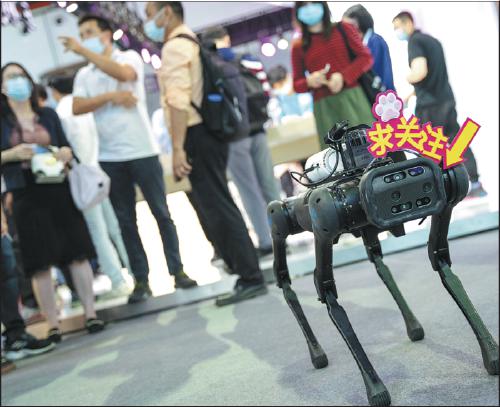
(Source: China Daily)
Businesses look to digital methods to secure trade amid restrictions caused by pandemic
China applied for a total of 694,000 artificial intelligence patents as of October-an increase of 56.3 percent compared with same period last year-buoyed by infrastructure construction, including 5G networks and data centers, despite the COVID-19 pandemic, a recent report said.
AI-powered technologies have played a vital role in fighting the contagion, with continuous innovation and the application of AI patents rising in recent years, according to a report issued by the China Industrial Control Systems Cyber Emergency Response Team and the Electronic Intellectual Property Center under the Ministry of Industry and Information Technology.
By the end of 2019, China outpaced the United States in the number of worldwide AI-related patent applications for the first time, the report said.
Chinese internet search giant Baidu was granted 2,682 AI-related patents and filed a total of 9,364 AI-related patent applications as of October. It ranked first in AI applications for the third consecutive year, followed by Tencent (8,450), Huawei (7,381) and Inspur (7,052).
The report showed that Baidu is the leader of both patents and patent applications in several important sub-fields of AI. These include deep learning, natural language processing, intelligent speech, autonomous driving, knowledge graph, intelligent recommendations and big data for transportation.
The patented technologies in deep learning have been utilized in PaddlePaddle, Baidu's open-source industrial-level deep-learning platform.
Its core technological strengths in autonomous driving have empowered projects such as the Apollo Go Robotaxi service, which is available in Beijing, Changsha in Hunan province and Cangzhou in Hebei province.
The Beijing-based tech heavyweight said it will continue to invest in and further explore AI technologies and applications in products and vertical industries. It will also promote intelligent transformation and serve as a new engine for economic growth.
Meanwhile, Tsinghua University, Zhejiang University, Beihang University and other colleges and universities have become a mainstay of AI innovation, the report said.
The study noted that cloud computing, as the basic supporting technology of AI, accounts for 18.38 percent of all the AI patent applications. Computer vision, as a kind of applied technology in the field, takes up 17.72 percent.
In addition, deep learning, autonomous driving and intelligent robots account for 14.52 percent, 12.36 percent and 9.55 percent, respectively.
As of October, Chinese enterprises and research institutions have applied for 3,036 patents that involve COVID-19, covering epidemic surveillance and prevention, medical treatment and resource allocation.
In the field of noncontact remote temperature screening, Baidu, Tsinghua University and other companies and research institutions have filed 244 AI-related patent applications and were granted 41 AI-related patents.
The country has placed great emphasis on tech development, with AI being a key field. The government has laid out plans at building a 1 trillion yuan ($152.9 billion) AI core industry by 2030. It is expected to stimulate related businesses by around 10 trillion yuan.
So far, AI-enabled technologies have been applied in several sectors, such as finance, healthcare, transportation and education. Global consultancy PricewaterhouseCoopers said AI will play a massive role in boosting the global economy. They expect AI's contribution to the global economy to leap from $2 trillion in 2018 to $15.7 trillion by 2030.
"China is fast becoming a global hub for innovation, particularly in the field of AI," said Zhu Wei, senior managing director and chairman of consultancy Accenture China.
He added that Chinese companies have demonstrated great determination to digitize their organizations amid the current complex business environment.
(Source: China Daily)









